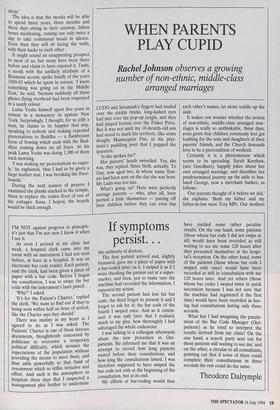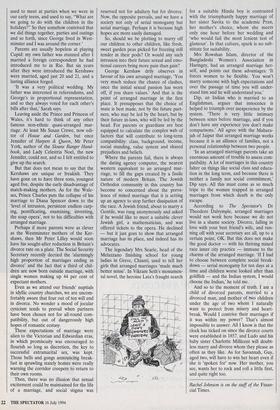WHEN PARENTS PLAY CUPID
Rachel Johnson observes a growing
number of non-ethnic, middle-class arranged marriages
LUDO and Savannah's fingers had tussled over the stickle bricks, long-lashed eyes had met over the pop-up jungle, and they had played footsie over the Fisher Price. But it was not until my 18-month-old son had stood to mark his territory, like some doughy Mannequen Piss, in his play- mate's paddling pool that I popped the question. 'Is she spoken for?'
Her parents' heads swivelled. Yes, she was, they replied. Since birth, actually. To Guy, now aged two, in whose name flow- ers had been sent on the day she was born. My Ludo was too late. What's going on? Here were perfectly average parents — who, after all, have partied a little themselves — pairing off their children before they can even lisp each other's names, let alone toddle up the aisle.
It makes one wonder whether the notion of non-ethnic, middle-class arranged mar- riages is really so unthinkable, these days, even given that children commonly feel gut loathing for the sons and daughters of their parents' friends, and the Church demands love to be a precondition of wedlock.
Certainly it is a phenomenon which seems to be spreading. Sarah Kershaw, (née Goodhart), happily jokes about her own arranged marriage, and describes her predetermined journey up the aisle to hus- band George, now a merchant banker, as follows.
'Our parents thought of it before we did,' she explains. 'Both my father and my father-in-law were Tory MPs. Our mothers used to meet at parties when we were in our early teens, and used to say, "What are we going to do with the children in the holidays?" So they somehow contrived that we did things together, parties and outings and so forth, since George lived in West- minster and I was around the corner.'
Parents are usually hopeless at playing Cupid: my own father was stunned after I married a foreign correspondent he had introduced me to in Rio. But six years after they were introduced the Kershaws were married, aged just 20 and 21, and a lasting alliance forged.
'It was a very political wedding. My father was interested in referendums, and George's in proportional representation, and so they always voted for each other's bills after that,' Sarah says.
Leaving aside the Prince and Princess of Wales, it's hard to think of any other famous non-ethnic quasi-arranged mar- riage. At least Ms Susan Crewe, now edi- tor of House and Garden, but once Jennifer of Harpers & Queen, Mr Peter York, author of the Sloane Ranger Hand- book, and Lady Celestria Noel, the new Jennifer, could not, and so I felt entitled to give up the search.
But that does not mean to say that the Kershaws are unique or freakish. They have gone on to have three sons, youngest aged five, despite the early disadvantage of match-making mothers. As for the Wale- ses, Prince Charles puts the collapse of his marriage to Diana Spencer down to the 'level of intrusion, persistent endless carp- ing, pontificating, examining, inventing, the soap opera', not to his difficulties with arranged marriage.
Perhaps if more parents were as clever as the Westminster mothers of the Ker- shaws, then Mr Peter Lilley would soon have his sought-after reduction in Britain's divorce rate on a plate. The Social Security Secretary recently decried the 'alarmingly high proportion of marriages ending in divorce' and the fact that a third of chil- dren are now born outside marriage, with single women making up 44 per cent of expectant mothers.
Even as we attend our friends' nuptials in idyllic country churches, we are uncom- fortably aware that four out of ten will end in divorce. No wonder a mood of jocular cynicism tends to prevail when partners have been chosen not for all-round com- patibility, but out of dangerously high hopes of romantic ecstasy.
These expectations of marriage were alien to the Victorian and Edwardian eras, in which promiscuity was encouraged to flourish so long as discretion, the key to successful extramarital sex, was kept. Those bells and gongs announcing break- fast in sprawling stately homes were really warning the corridor creepers to return to their own rooms.
Then, there was no illusion that sexual excitement could be maintained for the life of a marriage, and social stigma was reserved not for adultery but for divorce. Now, the opposite prevails, and we have a society not only of serial monogamy but serial marriage. Perhaps it is because high hopes are more easily damaged.
So, should we be plotting to marry off our children to other children, like fresh, sweet garden peas picked for freezing still tender in their pods? Or would any such intrusion into their future sexual and emo- tional careers bring more pain than gain?
George Kershaw drily observes in favour of his own arranged marriage, 'You very much reduce the chance of clashes, once the initial sexual passion has worn off, if you share values.' And that is the point of arranged marriage in the first place. It presupposes that the choice of mate is best made, not by the future part- ners, who may be led by the heart, but by their future in-laws, who will be led by the head. For parents or guardians are best equipped to calculate the complex web of factors that will contribute to long-term compatibility: class, background, income, social standing, value system and shared prejudices and beliefs.
Where the parents fail, there is always the dating agency computer, the nearest western equivalent to an arranged mar- riage, to fill the gaps created by a fissile nature of modern Britain. The Jewish Orthodox community in this country has become so concerned about the preva- lence of mixed marriage that it is setting up an agency to stop further dissipation of the race. A Jewish friend, about to marry a Gentile, was rung anonymously and asked if he would like to meet a suitable clever Jewish girl, a mathematician, and was offered tickets to the opera. He declined — but it just goes to show that arranged marriage has its place, and indeed has its advocates.
The legendary Mrs Searle, head of the Melazzano finishing school for young ladies in Greve, Chianti, used to tell her girls that arranged marriages 'made much better sense'. In Vikram Seth's monumen- tal novel, the heroine Lata's fraught search for a suitable Hindu boy is contrasted with the triumphantly happy marriage of her sister Savita to the academic Pran, her mother's choice, whom she meets only one hour before her wedding and 'who would fail the most lenient test of glamour'. In that culture, spark is no sub- stitute for suitability.
Mrs Rowshan Islam, director of the Bangladeshi Women's Association in Haringey, had an arranged marriage her- self, and points out these advantages: 'It forces women to be flexible. You won't marry someone with high expectations and over the passage of time you will under- stand him and he will understand you.'
Dip, an Indian who is married to an Englishman, argues that innocence is helped to triumph over inexperience by the system. 'There is very little intimacy between sexes before marriage, and if you don't have any experience you don't make comparisons.' All agree with the Mahara- jah of Jaipur that arranged marriage works because it is an alliance of families, not a personal relationship between two people.
'In an arranged marriage parents take an enormous amount of trouble to assess com- patibility. A lot of marriages in this country falter on things like social class and educa- tion in the long term, and because there is neither a family nor social commitment,' Dip says. All this must come as so much tripe to the women trapped in arranged marriages from which death is the only escape.
According to The Spectator's Dr Theodore Dalrymple, arranged marriages would not work here because we do not live in a shame society. Divorce, falling in love with your best friend's wife, and run- ning off with your secretary are all, up to a certain point, OK. But this does not make the good doctor — with his thriving mixed race inner city practice — immune to the charms of the arranged marriage. 'If I had to choose between complete social break- down — serial monogamy for ten days at a time and children worse looked after than goldfish — and the Indian system, I would choose the Indian,' he told me.
And so to the moment of truth. I am a child of divorced parents, married to a divorced man, and mother of two children under the age of two whom I naturally want to protect from misery and heart- break. Would I contrive their marriages if it was within my power? That's almost impossible to answer. All I know is that the clock has ticked on since the divorce courts were established in 1857, and Ludo and his baby sister Charlotte Millicent will doubt- less marry and divorce whom they please as often as they like. As for Savannah, Guy, aged two, will have to win her heart even if she is 'spoken for' now. Her mother, you see, wants her to rock and roll a little first, and quite right too.
Rachel Johnson is on the staff of the Finan- cial Times.



















































 Previous page
Previous page